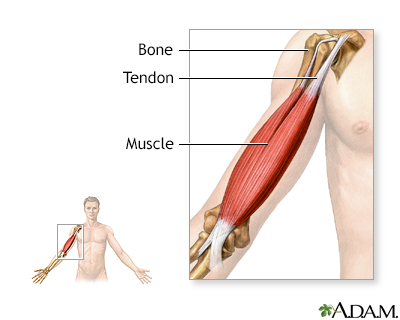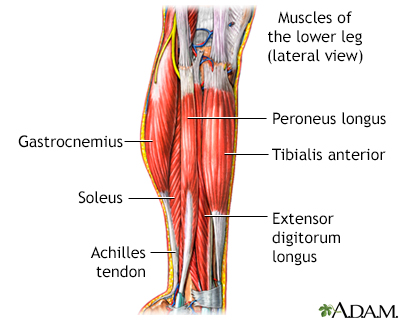Myotonia congenita
Thomsen's disease; Becker's disease
Myotonia congenita is an inherited condition that affects muscle relaxation. It is congenital, meaning that it is present from birth. It occurs more frequently in northern Scandinavia.
Images




I Would Like to Learn About:
Causes
Myotonia congenita is caused by a genetic change (genetic variant). It is passed down from either one or both parents to their children (inherited).
Myotonia congenita is caused by a problem in the part of the muscle cells that are needed for muscles to relax. Abnormal repeated electrical signals occur in the muscles, causing a type of muscle stiffness called myotonia.
Symptoms
The hallmark of this condition is myotonia. This means the muscles are unable to quickly relax after contracting. For example, after a handshake, the person is only very slowly able to open and pull away their hand.
Early symptoms may include:
- Difficulty swallowing
- Gagging
- Stiff movements that improve when they are repeated
- Shortness of breath or tightening of the chest at the beginning of exercise
- Frequent falls
- Difficulty opening eyes after forcing them closed or crying
Children with myotonia congenita often look muscular and well-developed. They may not have symptoms of myotonia congenita until age 2 or 3.
Exams and Tests
Your health care provider may ask if there is a family history of myotonia congenita.
Tests include:
- Electromyography (EMG) and nerve conduction studies (NCS)
- Genetic testing
- Muscle biopsy
Treatment
As cold and stress can worsen symptoms, management is first directed at avoiding these potential triggers. Some forms of exercise may also be beneficial. Mexiletine is a medicine that treats symptoms of myotonia congenita. Other treatments include:
- Phenytoin
- Procainamide
- Quinine (rarely used now, due to side effects)
- Carbamazepine
Support Groups
The following resources can provide more information on myotonia congenita:
- Muscular Dystrophy Association -- www.mda.org/disease/myotonia-congenita
- National Library of Medicine, Medline Plus -- medlineplus.gov/genetics/condition/myotonia-congenita/
Outlook (Prognosis)
People with this condition can do well. Symptoms only occur when a movement is first started. After a few repetitions, the muscle relaxes and the movement becomes normal.
Possible Complications
Complications may include:
- Aspiration pneumonia caused by swallowing difficulties
- Frequent choking, gagging, or trouble swallowing in an infant
- Long-term (chronic) joint problems
- Weakness of the abdominal muscles
When to Contact a Medical Professional
Contact your provider if your child has symptoms of myotonia congenita.
Prevention
Couples who want to have children and who have a family history of myotonia congenita should consider genetic counseling.
Related Information
Autosomal dominantAutosomal recessive
Aspiration pneumonia
References
Bryan ES, Alsaleem M. Myotonia congenita. In: StatPearls [Internet]. Treasure Island (FL): StatPearls Publishing; 2024. Updated August 28, 2023. PMID: 32966006 www.ncbi.nlm.nih.gov/books/NBK562335/.
Kang MK, Kerchner GA, Ptácek LJ. Channelopathies: episodic and electrical disorders of the nervous system. In: Jankovic J, Mazziotta JC, Pomeroy SL, Newman NJ, eds. Bradley and Daroff's Neurology in Clinical Practice. 8th ed. Philadelphia, PA: Elsevier; 2022:chap 98.
Manzur AY. Muscular dystrophies. In: Kliegman RM, St. Geme JW, Blum NJ, et al, eds. Nelson Textbook of Pediatrics. 22nd ed. Philadelphia, PA: Elsevier; 2025:chap 649.
Selcen D. Muscle diseases. In: Goldman L, Cooney KA, eds. Goldman-Cecil Medicine. 27th ed. Philadelphia, PA: Elsevier; 2024:chap 389.
BACK TO TOPReview Date: 3/31/2024
Reviewed By: Joseph V. Campellone, MD, Department of Neurology, Cooper Medical School at Rowan University, Camden, NJ. Review provided by VeriMed Healthcare Network. Also reviewed by David C. Dugdale, MD, Medical Director, Brenda Conaway, Editorial Director, and the A.D.A.M. Editorial team.

Health Content Provider
06/01/2025
|
A.D.A.M., Inc. is accredited by URAC, for Health Content Provider (www.urac.org). URAC's accreditation program is an independent audit to verify that A.D.A.M. follows rigorous standards of quality and accountability. A.D.A.M. is among the first to achieve this important distinction for online health information and services. Learn more about A.D.A.M.'s editorial policy, editorial process and privacy policy. A.D.A.M. is also a founding member of Hi-Ethics. This site complied with the HONcode standard for trustworthy health information from 1995 to 2022, after which HON (Health On the Net, a not-for-profit organization that promoted transparent and reliable health information online) was discontinued. |
The information provided herein should not be used during any medical emergency or for the diagnosis or treatment of any medical condition. A licensed medical professional should be consulted for diagnosis and treatment of any and all medical conditions. Links to other sites are provided for information only -- they do not constitute endorsements of those other sites. © 1997- 2025 A.D.A.M., a business unit of Ebix, Inc. Any duplication or distribution of the information contained herein is strictly prohibited.
